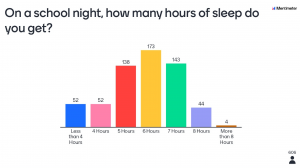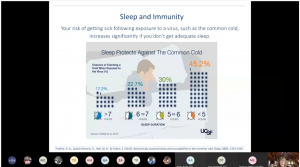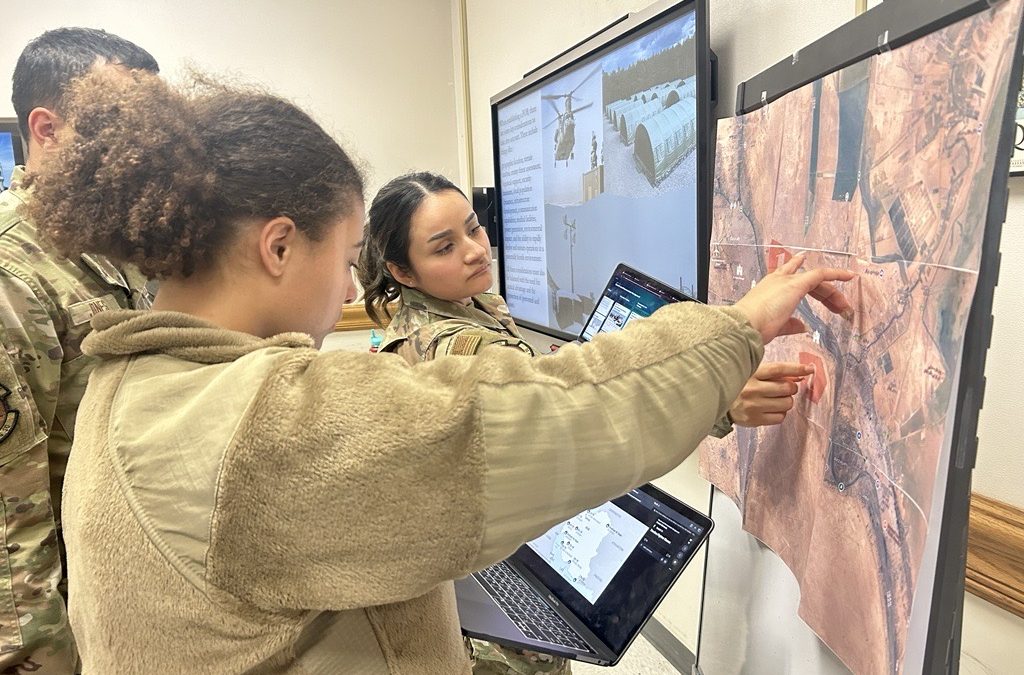By Tammy Cario
In a recent town hall with Defense Language Institute Foreign Language Center students that was sprinkled with survey questions about studies and stress, Col. Gary Hausman, DLIFLC commandant, asked them to respond to an unusual question: how much sleep did each student get on a school night?

Col. Gary Hausman, commandant of DLIFLC, asks this question during an interactive virtual town hall for DLIFLC students held June 16, 2020.
Over two thirds of the students who responded said they received six or less hours of sleep per night. This means less than a third of the students at DLIFLC are getting the recommended seven to nine hours of sleep.
Lack of sleep is a detriment because, according to sleep expert Dr. Nita Shattuck, adequate sleep is crucial for learning. DLIFLC students spend at least seven hours per day in class and have about two to three hours of homework each night. On top of this, they have military duties.
Shattuck, a professor of operations research at the Naval Postgraduate School with 30 years of experience studying sleep, spoke to DLIFLC students in a virtual meeting last month, with Hausman listening in. During her talk, Shattuck explained a study she and her team did with the Navy Recruit Training Command in Great Lakes, Michigan. The recruits were getting roughly six hours of sleep per night. With a simple shift from six hours to eight hours a night, Shattuck’s team collected and compared the before and after test results to see if getting more sleep had affected their training.
“What we see on standardized tests is highly significant differences when they are getting eight hours of sleep,” she said. “It’s as if we gave these people an infusion of IQ. [To] make them smarter, give them more sleep.”
Just how much good can sleep do for you? A lot, according to Shattuck.
Better sleep is linked to:
- Improvements in memory
- Alertness and concentration
- Productivity and performance
- Endurance
- Ability to tolerate frustration
- Happiness and optimism
- Reduction of risk of injuries
Just as telling is how sleep deprivation can harm you.
- It reduces your ability to control your impulses
- Makes it challenging to interpret other people’s emotions, interact effectively and maintain good relationships
- It also harder to pay attention or remember new information
- There is an increased risk of motor accidents
- It is associated with psychiatric conditions such as depression, suicidal ideation and substance abuse
Another way sleep deprivation can affect you is an imbalance of the hormone ghrelin and leptin. When these hormones get disrupted, she said, “you crave carbs and you don’t have any brakes” to know when to stop consuming food. This can lead to weight gain and obesity.
More important to the students at DLIFLC, proper sleep means better learning.
“Sleep affects molecular, cellular and network mechanisms that govern memory systems,” Shattuck said, “The sleeping brain is optimized for memory consolidation but sleeping for just a few hours is not enough to retain all new information.”
Obviously, sleep is not the only answer to learning. But it’s a matter of prioritizing what is important.
For Dr. Jonathan Gajdos, dean of the Persian Farsi school, bringing Shattuck in to speak with his students started when one of the students fell asleep in their barracks while taking a test remotely. Shattuck had spoken during a DLIFLC event last year and she came to mind, he said, when this issue came to his attention.
“Sleep is an issue our students struggle with due to the demands of balancing their military and academic obligations,” Gajdos said. He went on to explain that with all of the recent upheaval, “the remote environment, schedule disruptions, screen time and restrictions on activities, sleep issues can be an impediment to academic success.”
DLIFLC leadership is raising awareness and encouraging their students to get enough sleep because, as Shattuck explained, “improved test scores, better retention of knowledge, fewer sick calls, decrease in discipline problems and in depression, improved morale and lower attrition rates,” were predicted when students increased their slumber.
So where does that leave someone who is chronically deprived of sleep? Shattuck has some suggestions.
Make a sleep plan
You need to set a bedtime early enough to get at least seven hours of sleep. “Protect your circadian rhythm by going to bed at the same time each day,” Shattuck advised. “Exercise sleep discipline.”
Preparation starts in the daytime?
Limit caffeine and energy drinks to the first half of your day. Avoid alcohol and heavy foods before bedtime.
Ideal sleep conditions
Shattuck advises complete darkness – not even a pinhole of light – and quiet, as well as cool ambient temperature. Also, interestingly enough, she has a suggestion to eliminate offending sources of odors.

Dr. Nita Shattuck presents her slides on the benefits of sleep during a virtual talk with a group of DLIFLC students held May 20, 2020.
One last note from Dr. Shattuck. In today’s very real threat of viral infections, with sleep and immunity inextricably linked, she explained that the risk of getting sick goes up significantly if you don’t get adequate sleep.
“One of the most important things you can do if you’re trying to avoid getting ill and contracting any virus, including COVID-19, is get sleep.”




